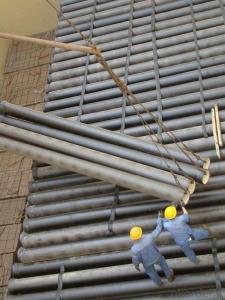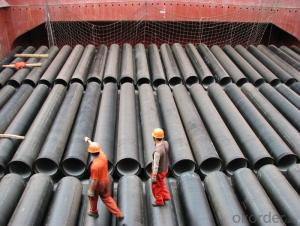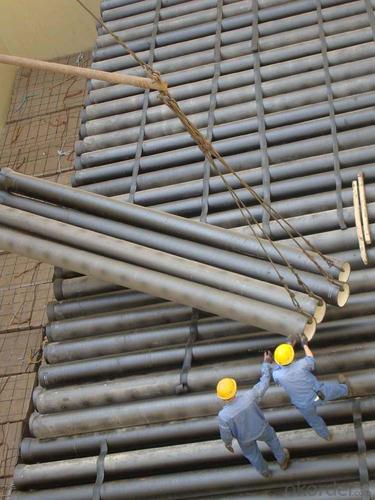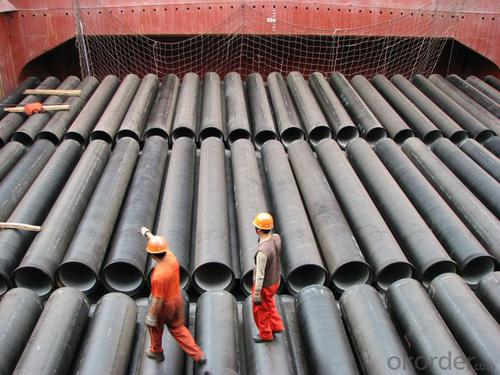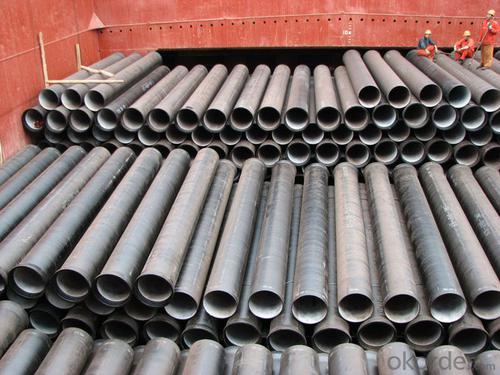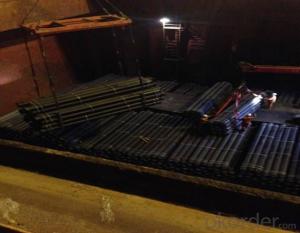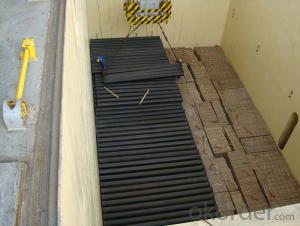DUCTILE IRON PIPE DN500 K9
- Loading Port:
- China Main Port
- Payment Terms:
- TT OR LC
- Min Order Qty:
- -
- Supply Capability:
- -
OKorder Service Pledge
OKorder Financial Service
You Might Also Like
Specification:
1) The standard of pipe: ISO2531:1998, K9
2) Effective length: 6m
3) Inner cement line: Portland cement line as per ISO4179
4) Zinc coating: at least 130g/m2 as per ISO8179
5) Bitumen painting: at least 70um as per ISO8179
6) With 100% quantity of NBR ring, or SBR ring, or EPDM ring as per ISO4633
7) DN80mm-800mm
8) High strength, lighter than grey iron, good corrosion resistance, no furring, small flow resistance, easy fixing, long life tome about 100 yeas
9) Produced by Hangzhou chunfeng machine
10) Checked by automatic inspection equipment
11) Composition:
Chemical composition | | | | |||
Chemical composition | Ductile Cast Iron Pipe (%) | Grey iron pipe (%) | Steel pipe (%) | | | |
C | 3.5-4.0 | 3.2-3.8 | 0.1-0.2 | | | |
Si | 1.9-2.6 | 1.4-2.2 | 0.15-0.4 | | | |
Mn | 0.15-0.45 | 0.4-0.6 | 0.3-0.6 | | | |
P | ≤0.06 | ≤0.3 | 0.02-0.03 | | | |
S | ≤0.02 | ≤0.1 | 0.02-0.03 | | | |
Mg | 0.03-0.06 |
|
| | | |
12) Feature:
Mechanical properties | | | | |||
| Ductile Cast Iron Pipe | Grey Iron Pipe | Steel Pipe | | | |
Tensile Strength(Mpa) | ≥420 | 150-260 | ≥400 | | | |
Yield Strength(Mpa) | ≥300 | No Confirmation | No Confirmation | | | |
Bending Strength(Mpa) | ≥590 | 200-360 | ≥400 | | | |
Elongation (%) | ≥10 | Neglected | ≥18 | | | |
Brinell Hardness(HBS) | ≤230 | ≤230 | About 140 | | | |
13) T type mechanical joint
14) Packing: in bulk or container
- Q: Are ductile iron pipes suitable for bridge crossings or crossings under roadways?
- Yes, ductile iron pipes are suitable for bridge crossings or crossings under roadways. Ductile iron pipes are known for their strength, durability, and resistance to external forces such as heavy traffic loads or bridge movements. They have a high tensile strength and can withstand the stress and strain caused by the weight of vehicles passing over them. Additionally, ductile iron pipes are highly corrosion resistant, making them suitable for underground installations where they may be exposed to water or other corrosive elements. Moreover, these pipes have a long lifespan and require minimal maintenance, making them a reliable choice for bridge crossings or crossings under roadways. Overall, ductile iron pipes provide a cost-effective and efficient solution for such infrastructure projects.
- Q: What are the advantages of using ductile iron pipe over concrete pipe?
- There are several advantages of using ductile iron pipe over concrete pipe. Firstly, ductile iron pipe has a higher strength-to-weight ratio compared to concrete pipe. This means that it can withstand higher pressure and loads while being lighter in weight. This makes it easier to handle and install, reducing labor costs and time. Secondly, ductile iron pipe has superior corrosion resistance compared to concrete pipe. It is less likely to rust or degrade over time, which increases its lifespan and decreases the need for frequent repairs or replacements. This makes it a more cost-effective option in the long run. Additionally, ductile iron pipe has better flexibility and resilience compared to concrete pipe. It can withstand ground movement, settling, and other environmental factors without cracking or breaking. This makes it more durable and less prone to damage, reducing maintenance and repair costs. Moreover, ductile iron pipe has a smoother interior surface compared to concrete pipe. This results in improved flow characteristics and reduced friction, allowing for more efficient transportation of fluids. It also minimizes the risk of clogs or blockages, ensuring uninterrupted flow. Furthermore, ductile iron pipe is highly versatile and can be used in a wide range of applications. It is suitable for both above-ground and underground installations, making it ideal for various infrastructure projects such as water supply systems, wastewater treatment plants, and industrial applications. Overall, the advantages of using ductile iron pipe over concrete pipe include its higher strength-to-weight ratio, superior corrosion resistance, better flexibility and resilience, smoother interior surface, and versatility. These benefits make it a reliable and cost-effective choice for various infrastructure projects.
- Q: Can ductile iron pipes be used in areas with high levels of hydrogen sulfide gas?
- Yes, ductile iron pipes can be used in areas with high levels of hydrogen sulfide gas. Ductile iron pipes have a high corrosion resistance, which makes them suitable for such environments. Additionally, they have been successfully used in sewage systems and wastewater treatment plants where hydrogen sulfide gas is commonly present.
- Q: What is the expected fatigue life of ductile iron pipes under cyclic loading?
- The expected fatigue life of ductile iron pipes under cyclic loading can vary depending on various factors such as the magnitude and frequency of the cyclic loading, the quality of the material, the design and installation of the pipes, and the environmental conditions. Ductile iron is known for its high strength and ductility, which enables it to withstand cyclic loading to a certain extent. However, like any other material, it is also susceptible to fatigue failure over time. To estimate the expected fatigue life of ductile iron pipes, engineers often utilize fatigue analysis and testing methods. These methods involve subjecting representative samples of the pipes to cyclic loading under controlled conditions and measuring the number of cycles required for failure to occur. The results of these tests are then used to extrapolate the expected fatigue life of the pipes under similar loading conditions. It is important to note that the expected fatigue life can vary significantly depending on the specific conditions and loading patterns experienced by the pipes in a given application. Therefore, it is crucial to consider factors such as the operational demands, maintenance practices, and the overall structural integrity of the pipeline system. Additionally, the use of appropriate design standards and guidelines, along with regular inspection and maintenance, can help enhance the fatigue life of ductile iron pipes. In summary, while it is challenging to provide a specific value for the expected fatigue life of ductile iron pipes under cyclic loading, engineers can estimate it through fatigue analysis and testing methods. It is essential to consider various factors and maintain the pipes properly to ensure their longevity and prevent potential failures.
- Q: Can ductile iron pipes be used for underground storage tanks?
- Ductile iron pipes can indeed be used for underground storage tanks in certain situations. Ductile iron is a strong and durable material that is resistant to corrosion, making it suitable for underground applications. However, there are a few factors to consider before using ductile iron pipes for underground storage tanks. Firstly, it is important to assess the specific requirements and regulations of the project. Different regions and industries may have specific guidelines for the materials used in underground storage tanks. It is crucial to ensure that ductile iron pipes comply with these regulations and meet the necessary standards for underground storage. Secondly, the size and capacity of the storage tank should be considered. Ductile iron pipes are available in a variety of sizes, but they may not be suitable for large-scale storage tanks due to limitations in their dimensions. It is important to consult with engineers or experts to determine the appropriate pipe size and capacity for the specific storage requirements. Lastly, the design and installation of the underground storage tank should be carefully planned. Proper sealing and protection against external factors such as soil movements, water pressure, or other potential hazards should be considered. Adequate measures should be taken to prevent leaks or damage to the pipes, ensuring the safety and longevity of the storage tank. In conclusion, ductile iron pipes can be used for underground storage tanks, but it is essential to consider the specific requirements, regulations, sizing limitations, and proper design and installation. Consulting with professionals in the field and adhering to industry standards will ensure the successful use of ductile iron pipes for underground storage tanks.
- Q: Can ductile iron pipes be used for underground mining applications?
- Yes, ductile iron pipes can be used for underground mining applications. Ductile iron is known for its strength, durability, and resistance to corrosion, making it suitable for underground mining environments where it may be exposed to harsh conditions and abrasive materials. Additionally, ductile iron pipes have excellent load-bearing capabilities, making them ideal for carrying and transporting materials in mining operations.
- Q: How can the cast iron pipe of the ductile iron pipe be repaired?
- If it is ductile cast iron pipe, then use the plugging device can be used in the mouth of the big head plugging device, then use ordinary plugging device, if it is bent, we need on-site survey to do plugging device
- Q: Can ductile iron pipe be recycled?
- Yes, ductile iron pipe can be recycled. Ductile iron is a type of iron that is commonly used in the manufacturing of pipes due to its high strength and durability. When a ductile iron pipe reaches the end of its useful life, it can be recycled by melting it down and using the molten iron to create new products. Recycling ductile iron pipe not only helps conserve natural resources but also reduces the need for raw materials and energy-intensive processes involved in manufacturing new pipes. Additionally, recycling ductile iron pipe helps minimize waste and contributes to a more sustainable and environmentally friendly approach to infrastructure development.
- Q: Ductile iron pipe joint leakage
- The main reason for the leakage is that the installation is not in place, resulting in the loss of the apron. Sealed with cement or pipe head Hough section. Recommend the use of Hough section fast and convenient, and there is no menace from the rear.
- Q: Can ductile iron pipe be used for water distribution systems in cold climates?
- Yes, ductile iron pipe can be used for water distribution systems in cold climates. Ductile iron has excellent resistance to freezing and can withstand extreme cold temperatures without becoming brittle or cracking, making it a suitable choice for water distribution systems in cold climates.
Send your message to us
DUCTILE IRON PIPE DN500 K9
- Loading Port:
- China Main Port
- Payment Terms:
- TT OR LC
- Min Order Qty:
- -
- Supply Capability:
- -
OKorder Service Pledge
OKorder Financial Service
Similar products
Hot products
Hot Searches
Related keywords
